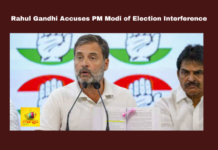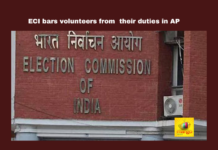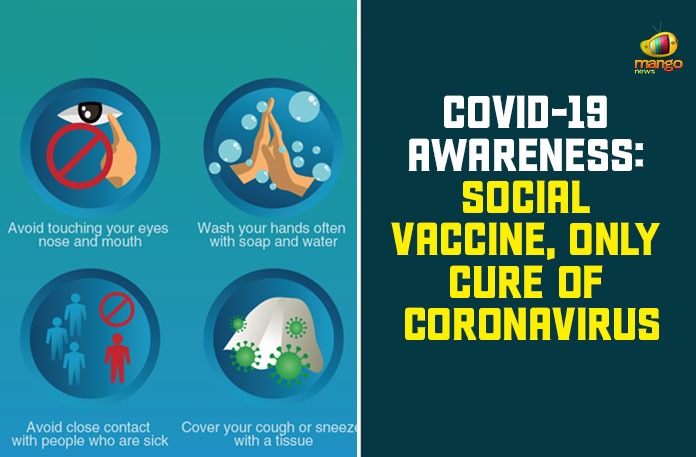As said by Dr. Harsh Vardhan, the Union Health Minister, social vaccine and need of this vaccine every hour is the only potential cure for the deadly Novel Coronavirus or COVID-19.
After reporting 12 lakh cases of the Novel Coronavirus or COVID-19, the need for following the social vaccine, sanitizer, hand wash and face mask is one of the major guidelines to prevent the spread of the virus.
In a Nation, where the population is 133 crores, it is difficult to know the COVID-19 status of every individual, hence the basic social vaccine would be a major help to control the spread of the virus.
With the rapid spread of the Novel Coronavirus or COVID-19, lack of isolation wards, quarantine centres and hospitals beds is a big problem. To add into this, individual falling sick could be a major challenge for out doctors and medical staff, hence everyone should be cautious about their duties and stay safe.
Till the 23rdof July, as many as 12 lakh people in India are infected by the Novel Coronavirus disease.
The everyday spike in cases is a matter of concern for not only the Central Government and state governments but, is also creating panic amongst the citizens of India.
It is now mandatory for an individual to help in the prevention of the spread of the virus and take to care of self as well as others.
In regard to this, the Central Government and the Centers for Disease Control and Prevention (CDC) recommended a few set of guidelines which could help in prevention of the COVID-19 infection.
The reason to release the set of guidelines is limited testing, less number of medical staff and doctors and a huge population.
In a population of 133 crores, only 2 crore people have been tested for the Novel Coronavirus.
Considering the figure, it would be better if the citizens of India would know the do’s and don’ts, mild symptoms, serious symptoms, doctors’ need, self isolation, immunity boost and other major factors related to the Novel Coronavirus.
People who are hospitalized or unstable, immunocompromised individuals, people with chronic severe illness, and health care workers, including first responders and people with breathing issues are ones who would fall under medical risk.
People who are unsure about COVID-19 test and get symptoms like fever, cough, sore throat, shortness of breath for 2-4 weeks should assume it to be Coronavirus infection and self isolate until tested negative.
Some people could also have symptoms of body aches, and/or diarrhea.
What are the necessary things to remember while going for self-isolation?
While self isolation you need to be at home, get rest, drink plenty of healthy fluids (like water, Gatorade.)
In addition, you should wash your hands often for 20 seconds with soap and water, use an alcohol based hand sanitizer that contains at least 60% alcohol and keep yourself under an hygienic environment.
High priority times to wash hands include:
After blowing your nose, coughing, or sneezing
After using the restroom, before eating or preparing food, after contact with animals or pets, before and after providing routine care for another person who needs assistance, such as a child.
To get relief from pain, one can rely on Tylenol (acetaminophen) pain relievers, fever reducers, decongestants and cough medicine to manage symptoms.
However, it is always safe to consult a chemist and doctor before taking any medications.
Do not go to work/school/public areas, it could spread the virus.
Avoid public transportation/ride-sharing/taxis.
Separate yourself from other people and animals in your home, particularly people with special vulnerability to COVID-19 infection like senior citizens (65 or older,) those with immune compromise and health care workers and children.
Do not welcome visitors into your home.
Use a separate bathroom, if available, and separate towels, utensils and bottles.
Cover your coughs and sneezes with the inside of your elbow or with a tissue, throwing the tissue away immediately afterwards.
People previously diagnosed with COVID-19 should wear a face mask when around other people if they are still having symptoms.
Clean high-touch surfaces every day with disinfectant, such as countertops, tables, doorknobs, toilets and computer keyboards.
Please check your temperature and monitor your symptoms daily.
Seek prompt medical care if you feel like you are getting worse.
Some of the worst medical condition which might need medical attention could be:
High fever, shortness of breath or difficulty breathing (feeling like you can’t get enough air, gasping, unable to speak without stopping for air, feelings of distress,) weakness, dizziness or chest pain.
If you are experiencing any of these symptoms, please call your primary doctor before seeking care or helpline numbers of your respective area.
Since the Novel Coronavirus or Covid-19 broke out globally, wearing face masks, using sanitizers and maintaining distance have become a new trend of living.
People are mandated to wear face masks in public, to avoid the chances of being infected of the Novel Coronavirus.
While the global outbreak of the disease, nearly 15 million people are infected, 5 million are dead and a large number of people are worried of being infected of the Novel Coronavirus infection.
With a lethal transmission and declared as an airborne disease, the pandemic Novel Coronavirus, gave humans a new standard of living.
Stay tuned for further updates about the Novel Coronavirus or COVID-19.


































